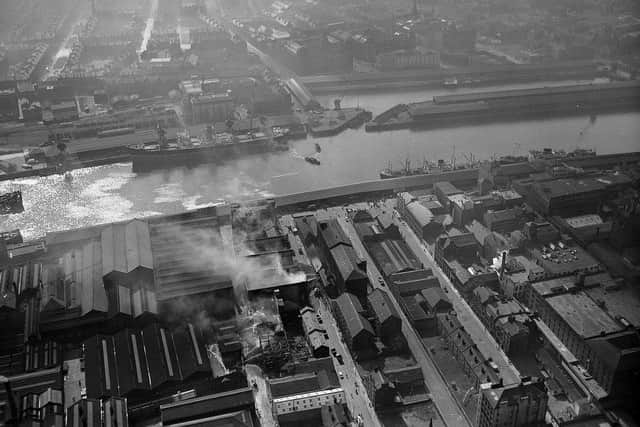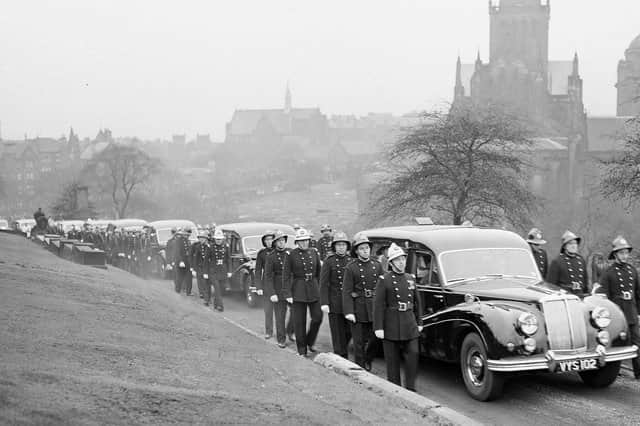Cheapside Street fire: Glasgow marks 62 years since fatal blaze
and live on Freeview channel 276
Today the city pays tribute to 19 firefighters and crew died tackling a warehouse blaze 62 years ago in what was the biggest loss of life to the Fire Service in peacetime.
What happened?


Fourteen firefighters and five members of the Salvage Corps died while tackling a blaze at the Arbuckle, Smith and Company whisky bond in Cheapside Street on the evening of March 28, 1960.
Advertisement
Hide AdAdvertisement
Hide AdAn explosion inside the building caused its 60ft walls to crash down into Cheapside Street and Warroch Street.
The Scottish Fire and Rescue Service (SFRS) said it remains the largest peacetime loss of life ever suffered by Britain's fire and rescue services.
The fire started at a whisky warehouse containing over one million gallons of rum and whisky, and then spread to surrounding buildings, including an ice cream factory and a tobacco warehouse.
A total of 450 firefighters had been dispatched to put out a fire that took 11 hours to extinguish. The narrow streets surrounding the warehouse made fighting the fire difficult for the emergency services, and the incident drew widespread criticism of the city’s fire regulations.
Advertisement
Hide AdAdvertisement
Hide AdA memorial to those who lost their lives was placed at the bottom of Cheapside Street in 2010.
The warehouses which dominated the area have long been demolished with the memorial sitting on the walkway beside the River Clyde.
Among the tales of heroism, family members of those who perished in the blaze have spoken of their sense of loss but also of their pride in the sacrifice that their relatives had made.
Tommy McIntyre, whose father George was among the firefighters killed, described the moment his family learned of the disaster. He said: "My mother and I had been watching Wagon Train on television and it abruptly finished and went directly to the ITN news in London. The news reader said that four firemen had been killed in a disastrous fire in Glasgow and 17 were trapped."
Advertisement
Hide AdAdvertisement
Hide AdMr McIntyre, whose family lived at the fire station where his father worked, went to Cheapside Street to find out what had happened to him. "I was talking to firemen there, asking them if they had my dad, but they all said, 'No, he might be down at the Clyde side'. I think a couple knew what had happened and didn't to tell me until later on.
"I stayed there until 10 o'clock and then went back to the North West fire station, and it was shortly after that my mother was told of his death. It was just terribly, terribly sad, but I'm immensely proud of my father and what he did."
The Cheapside Street fire, among others, had justified Glasgow’s unofficial nickname as ‘Tinderbox City’ - tragically, the fire did not prove to be the catalyst for much sought-after reforms. Another fire, mere blocks away from Cheapside Street in an upholstery factory, killed 22 people who were trapped in the building.
List of victims


The men who died were sub officers James Calder and John McPherson; firemen John Allan, Christopher Boyle, Gordon Chapman, William Crocket, Archibald Darroch, Daniel Davidson, Alfred Dickinson, Alexander Grassie, George McIntyre, Edward McMillan, Ian McMillan and William Watson; superintendent salvageman Edward Murray, leading salvageman James McLellan and salvagemen Gordon McMillan, James Mungall and William Oliver.
A version of this article first appeared on our sister site, The Scotsman
Comment Guidelines
National World encourages reader discussion on our stories. User feedback, insights and back-and-forth exchanges add a rich layer of context to reporting. Please review our Community Guidelines before commenting.